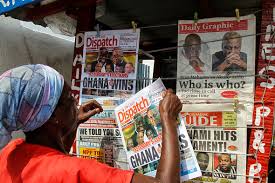The increase in cocoa producer price from GH¢8,240 to GH¢10,560 per tonne in 2020/21 crop year.and reduction in recorded malaria deaths in children under five are some of the leading stories in Ghanaian press on Friday.
The Graphic reports that the Ghanaian government has increased the cocoa producer price from GH¢8,240 to GH¢10,560 per tonne for the 2020/21 crop year.
The current increment, working out to 28 percent over the previous year’s price, also translates into GH¢660 per bag of 64 kilogrammes.
The President, Nana Addo Dankwa Akufo-Addo, made the announcement at the Western North Regional capital, Sefwi Wiawso, yesterday, where he also launched the Cocoa Rehabilitation Programme.
“Nananom, beginning 1st October 2020, I am happy to announce the award of a new cocoa producer price of ten thousand, five hundred and sixty cedis (GH¢10,560) per tonne, equivalent to six hundred and sixty cedis (GH¢660) per bag for the coming 2020/21 crop year. This represents a hike of more than twenty-eight per cent (28 per cent) over the price obtained in the outgoing crop year of 2019/2020,” he said.
The newspaper says that Ghana has recorded a reduction in malaria deaths in children under five by 83 per cent over the last eight years.
The report quoted the National Malaria Control Programme (NMCP) as saying that the rate of malaria-related deaths reduced from 0.6 percent in 2012 to 0.1 percent in 2019, showing significant inroads in malaria-related deaths among children.
Malaria-related deaths of all ages also reduced by 2,799 in 2012 to 333 by end of 2019, representing an 88 percent reduction.
The Deputy Programme Manager of the NMCP, Mr. James Frimpong, who made this known at an Editors’ forum in Accra yesterday, said although malaria incidence was still high, the integrated approach deployed to control it had resulted in remarkable reduction in deaths.
The Graphic also reports that the International football game between the Black Stars of Ghana and Equatorial Guinea has been called off.
Ghana was scheduled to play the Central Africans on Monday, October 12, in one of two friendlies lines up for the team in next month’s FIFA International window (except for European Countries).
The report added that Equatorial Guinean Football Association informed the GFA of the latest decision late Thursday, citing new travel restrictions imposed in their country. Equatorial Guinea’s borders are closed, and flights are suspended due to new COVID-19 rules.
The GFA has immediately set in motion an alternative plan to secure another match for the team as the coaches prepare for the upcoming AFCON qualifier against Sudan in November.
The newspaper also says that the members of the Volta separatist, the Homeland Study Group Foundation (HSGF) on Friday dawn blocked some roads in the Volta Region of Ghana.
The police in a message on social media urged commuters to and from Accra to Ho, Aveyime, Adidome, Mepe, Akuse, Sogakope and Aflao to exercise caution as they were likely to experience traffic due to security operations within those areas.
“Anybody travelling on any of these roads should exercise caution,” the police message said.
The HSGF, a group championing the secession of parts of Ghana along the border with Togo, declared independence for the territory they call ‘Western Togoland’ on November 16, 2019.
Their action of blocking the roads on Friday morning, they said were part of their agitations for independence from Ghana.
The Times reports that work on a GH¢6.6-million rice-processing factory at Sefwi Akontombra in the Western North Region is scheduled for completion by end of October, this year.
The factory is one of five Common User Processing Facilities (CUF) currently under construction nationwide under the government’s One District-One Factory (1D1F) programme to process raw materials into products or convert agro-industrial materials into other products.
The programme is being led by the Rural Enterprises Programme (REP) of the Ministry of Trade and Industry with funding from the African Development Bank (AfDB).
Inspecting the factory yesterday, Minister of Trade and Industry, Alan Kyerematen, said the factory was in line with the government’s plan to decentralise industrialisation and support communities to add value to their agricultural produce.
He noted that the factory would source raw materials from the many rice farmers in the area and become a business point for them.
GIK/APA


